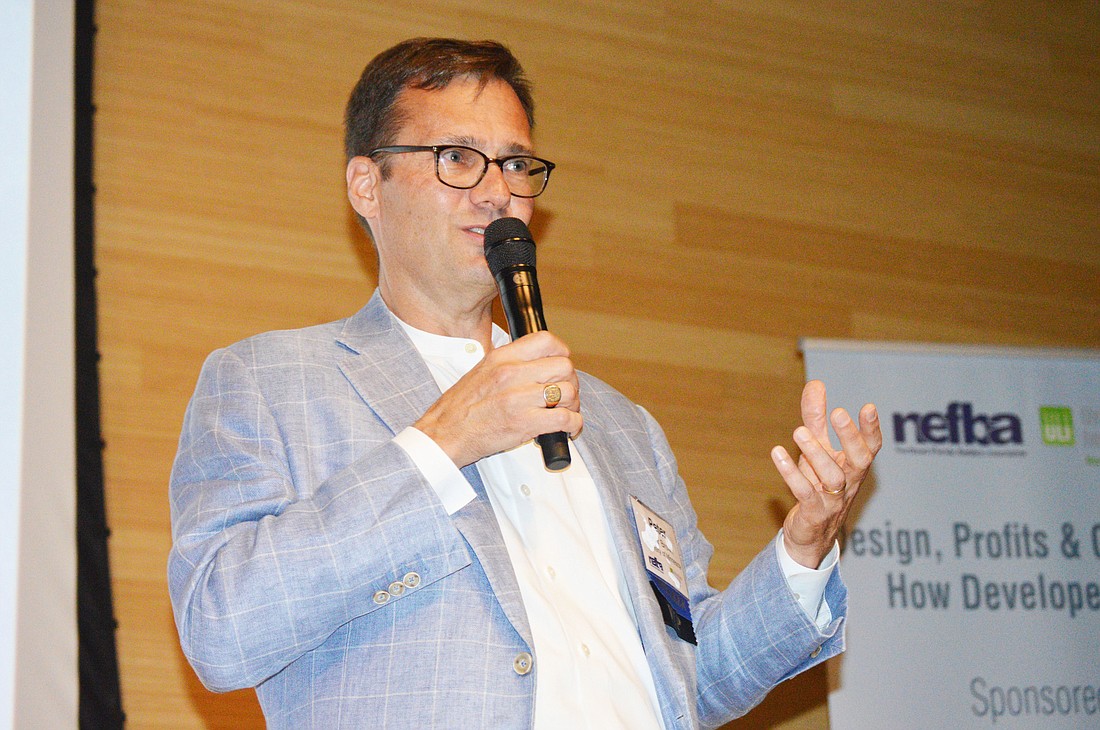
Peter Hendee Brown had a crowd of homebuilders transfixed when he told them some people think developers will eventually go away if they keep opposing their plans.
As an architect, planner, consultant and university professor who wrote a book titled “How Real Estate Developers Think: Design, Profits, and Community,” the Minneapolis resident said the problem with that thinking is what can happen if those community members are successful in discouraging a developer who sought to improve an area with their project.
“Don’t oppose for the sake of opposition and don’t kill a good deal because the next one may be worse and the next developer may not even come talk to you,” he said.
Brown spoke Aug. 15 to a full auditorium at the University of North Florida. The event was hosted by the Urban Land Institute and the Northeast Florida Builders Association.
In addition to builders and developers, the audience also included local elected officials, candidates looking to unseat those folks, and a few students.
Brown said he’s seen that type of development opposition often, which can lead to ugly projects being built in place of the original developer’s more pleasing plans. And the public usually is not even aware of the new project, because the new developer will build something that doesn’t require zoning changes or government approval, he said.
Brown asked the developers in attendance if they have dealt with that type of opposition, which was met with a resounding “yes” from a large part of the crowd.
Brown was invited to speak at the function and introduced by leaders of ULI and NEFBA, Maurice “Mo” Rudolph and Bill Garrison.
“As universal and far-reaching as the development industry is, it still remains largely misunderstood by too many people,” said Garrison, the executive officer of NEFBA. “Northeast Florida is growing into one of the most desirable regions in the country to live in, and that’s due in large part to the way it’s been developed.”
Additionally, JAX Chamber President Daniel Davis welcomed Brown and thanked the developers for building Jacksonville into what it is today, and encouraged them to continue, particularly in the city’s Downtown area.
“You’re the ones responsible for the success we’re having in the community,” he said. “You cannot have a great city without a great downtown. We have to create an urban environment that is attractive to young talent that is coming out of our higher ed institutions today. So we can’t take our foot off the gas.”
During the presentation, Brown said he decided to write the book after he came to the conclusion that “no one understands developers.”
Brown used a quote from famed Miami architect and planner Andrés Duany, who said that people “used to call them our town founders and we honored them by erecting their statues in our town squares. Today we just call them ‘developers.’”
Brown used examples from cities that have successfully redeveloped urban spaces, like Miami and Portland, Oregon. He said developers like John Carroll took big risks by building unique spaces in downtown areas.
The interesting thing is buyers immediately scooped up the Portland units that Carroll built and he ended up kicking off what became one of the city’s most popular areas, the Pearl District.
He didn’t do it by himself, Brown said, but by working with the government.
Brown said he wasn’t telling the Jacksonville-based developers that they had to do exactly what was done in Portland, but that they could learn valuable lessons from those who restored a once-blighted area.
He said it’s often hard to deal with members of the public, many of whom get incorrect information and often from sources like social media.
He said developers often are trying to build something that improves an area, but that some people think they’re just out to make money. While he said they obviously are still business professionals looking to make a living, they usually are seeking to make a neighborhood better.
He told the elected officials that their job is to support and promote good projects and don’t change building codes and other rules so often that it hinders the progress.
Finally, he encouraged community members upset with a potential project to make positive suggestions.
“Be realistic. If a developer has a 40-story building, don’t ask them to build three stories,” he said. “Think about where you can use your energy to recommend good change.”